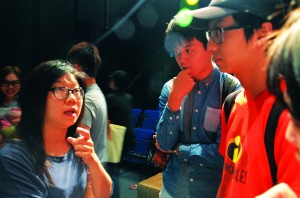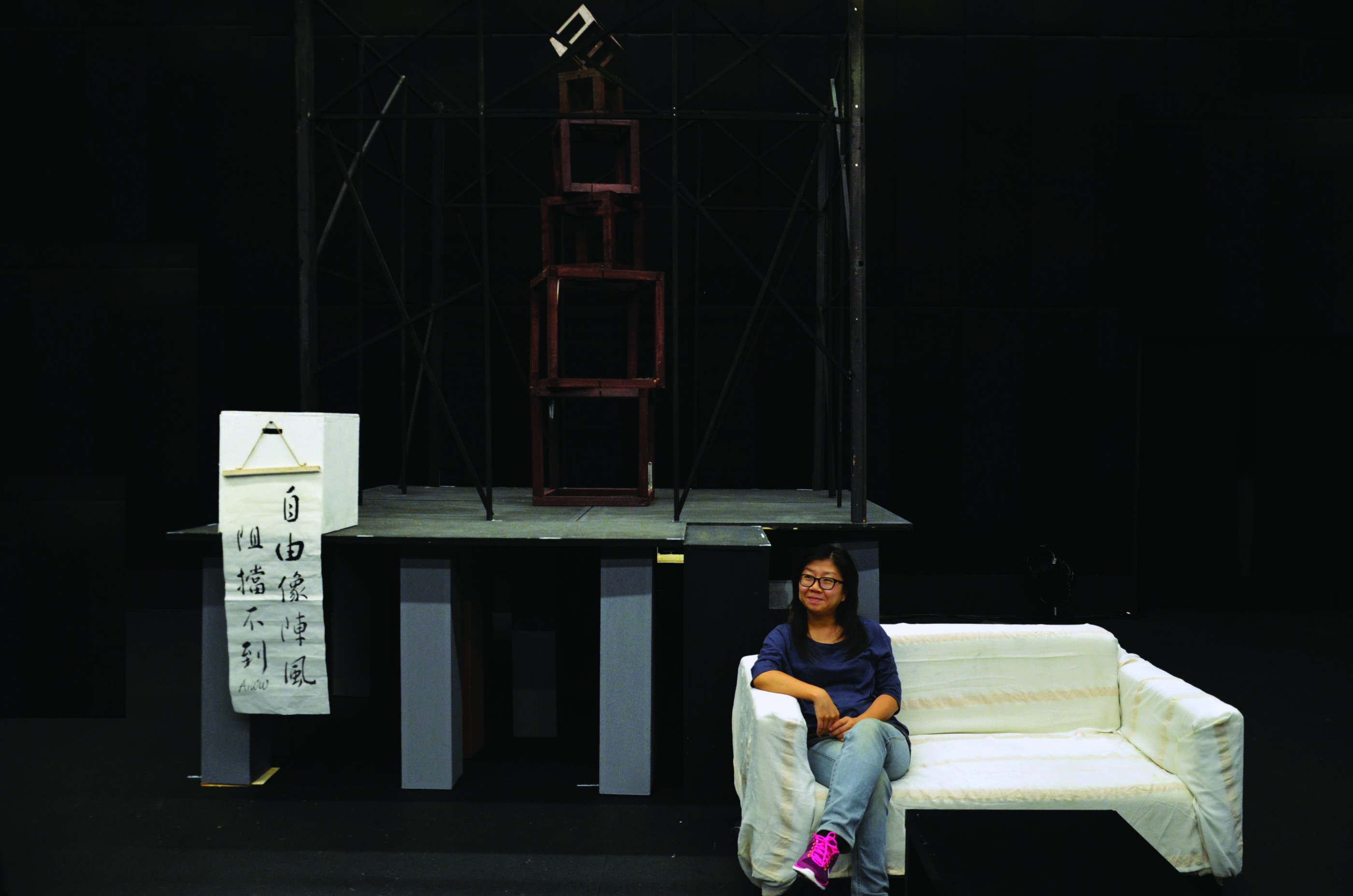Candace Chong Mui-ngam captures the social and political issues facing Hong Kong for the stage
By Sharon Lee
As the applause finally subsides in Kwai Ching’s Black Box Theatre, a dozen audience members soon surround a casually dressed woman in her thirties. She graciously accepts the compliments and answers the questions with smiles, standing next to a banner that reads, “Freedom is like wind, nothing can block it”. The banner is a prop in this student production of Candace Chong Mui-ngam’s acclaimed 2012 play, The Wild Boar, a work about media censorship.
Chong, 36, is one of the city’s most promising playwrights and a four time winner of the Best Script of the Hong Kong Drama Awards. Her winning scripts, Alive in the Mortuary (2003), Shall We Go to Mars? (2005), The French Kiss (2006), Murder in San José (2010), have been staged over and over again.

When extra performances for The Professor, her new play to mark the 50th anniversary of the Chinese University of Hong Kong, were announced, tickets for staff and the general public sold out within a day.
Ticket sales for Chong’s plays are no indication of their themes. Unlike some other popular dramas, her work addresses serious issues that might be expected to bore mass audiences.
For instance, The French Kiss (2006), examines religion, the law and moral judgement. The whole play takes place in just one setting and is basically a conversation between two people. However, it won the Best Script prize at the Hong Kong Drama Awards, has had three re-runs, and even been translated for performance in a Korean theatre.
While most of her previous works focus more on individuals struggling with human nature, her 2012 play The Wild Boar looks at society from a more macroscopic level by taking on the subject of media censorship.
In 2010, Chong read a newspaper report about a small drama troupe that had received threatening phone calls about a drama they were going to stage on the June 4 crackdown. Chong was extremely troubled that the reach of censorship could extend to theatre, as she believed drama was of limited influence in Hong Kong.
Nevertheless, she was glad that media censorship was not so prevalent that she was unable to read the news of the incident. The sense that something important was being threatened and the need to protect it drove her to write The Wild Boar.
While she was working on the play, Chong says she saw Hong Kong’s press freedom being challenged again and again with the media landscape changing faster than she had imagined. People feel that media organisations are controlled by the government while the voices of Hong Kongers are vanishing. “[People think that] there’s nothing we can do. Just let it be. But I don’t think so. So I wrote a play to talk about this,” Chong says.
Chong sees this belief as an aspect of herself that is childlike. While she is alert to the negative side of things, she is also an optimist who believes things can turn out well. “The reason you express things is because you think you can change the situation. It is a kind of idealism to think that speaking out and expressing yourself is useful.”
When she was younger, Chong was always thinking about the message and the conclusions she wanted to convey through a play. But as she got older, she realised there were more and more things she did not understand. So with success, she has gained humility. While she insists on speaking out through drama, she uses her voice to provoke discussion rather than broadcast solutions to the problems she raises.
Chong’s emphasis on justice and social systems in her work was inspired by the insights she gained while on a year-long study trip to the United States. She received a scholarship from the Asian Cultural Council in 2004 and travelled around the country from her base in New York.
As a foreigner, she took a step back to reflect on herself and look at her home city from a different perspective. At the same time, she saw how the people around her were passionately engaged in the US presidential election at the time. That changed her view on politics.
The shifts in Chong’s outlook and values in her plays can be seen as an increased concern about social issues. Chong’s earlier works deal with the darker reaches of the human psyche, reflecting her training as a psychology student at university. Murder in San José features secrets, jealousies and murder among a group of people who are close to one another. The French Kiss is about sexual harassment committed by a clergyman.
It may be a cliché, but Chong really does believe real life is more dramatic than plays. The French Kiss was inspired by a real story: a pastor kissed his secretary and was then charged with sexual harassment.
Chong later came across the pastor through a chance work encounter. She heard a conversation between the pastor and a man who asked him how long he was jailed for. The pastor said he had not been jailed but was fined HK$5,000. The man remarked that the pastor had been lucky. Chong recalls the pastor answered, “‘But I compensated with my reputation, family, friends and my soul.’”
“That line was shocking!” Chong says as she clenches her fists. “Sometimes when we write a play, we are just being an intermediary, distilling the essence of daily life so it can appear on stage for those who did not witness the real version.”
Chong provokes the audience to re-examine the verdict through the tense conversation between the pastor and the secretary and raises the problem of false memories brought about by self-deception and a selective memory.
This inner psychology is hinted at from time to time in her plays. “I am very interested in human nature. Otherwise I wouldn’t have studied psychology,” she says. In her undergraduate studies at the Chinese University of Hong Kong, she learnt how to observe and to identify the factors that contribute to human behaviour, such as human biology, thinking patterns, major life events, family and society.
As a result, Chong feels empathy for people who make mistakes. “No one is born to be evil. It is a step-by-step process. Any discussion of humanity should avoid black-or-white judgement.”
Just as the play encourages people to reflect on their inner being, Chong often examines herself too. As she recalls her mistakes in a past relationship, she says that she used to blame external factors for problems, until it dawned on her that, “I hurt that person because I was selfish.” These moments of clarity can arise in the most mundane moments, like when she is brushing her teeth. Over time, she has learnt to go easy on herself about past mistakes. “It’s not necessarily that you are forgiving yourself but you realise that life is made up of lots of regrets and mistakes.” Chong believes the important thing is to learn from them.
Although she studied psychology, Chong found she was a person who became too emotionally involved to be able to work in the field. So she pursued an advanced diploma programme at the Hong Kong Academy for Performing Arts on scriptwriting, a subject she had always been keen on.
It has been a decade since she started working as a playwright and Chong still relishes the challenges. She gives herself a new one every time she writes a play, and experiences the pain that accompanies it. “The enjoyment is so complicated. There are a lot of things in life that are painful but you would enjoy them. That’s masochism. And that’s what art really is.”
For Chong, the pain comes from her own expectations for her work. She always wants a different approach, a different character. “This pain is difficult to understand. It’s about failing to pass the standard you set for yourself. It’s exhausting. It messes up family life,” she says.
Since becoming a mother four years ago, Chong has struggled between spending more time with her son and writing, and with her multiple identities as a mother, a wife and a daughter-in-law.
When Varsity visits Chong’s home, her son’s toys and paintings are everywhere – on her bookshelves, on top of her work desk. Although everything is organised tidily, it is a clear indication to her that family life has encroached on her long-held private space and freedom. “A lot of things are not as free as before,” she says.
For the past few years, she has been navigating the spaces and compromises needed to find the space to write in within this new order. She wondered whether she should be writing overnight or while her son is at school. Soon she discovered she was too old or too tired to write during the early hours, once her favourite period for writing. Now, she has to wake early to send her son to school.
Chong often finds herself criticising her son when is busy and frustrated: “Why can’t you eat faster? How could you eat like a mess? Why do you throw up when eating?” Then she feels bad about her impatience, thinking she has set a bad example for her son.
The daily demands go beyond being a mother. “Handing in the bills, taking care of the family. . . When my mum’s computer is broken, I have to fix it, when my mother-in-law wants me to visit her I have to squeeze out a time slot and think about how to make arrangements for my son.
“I don’t actually like doing these things, I could easily feel annoyed. I dislike being troubled by trivial matters. I merely want to sit down and think.”
It seems a woman’s work is never done, but Chong is stoical about her chores. “It all comes as a package. There are both pains and pleasures.”
One morning, after she had been working through the night, Chong’s son left a picture on her desk – a drawing he had made of his mother working. The drawing is now stuck above her desk to constantly remind her of her son’s tender encouragement.
Apart from family support, the theatre and drama itself are the incentives for her work. Chong says art is forceful in many ways. “It has the power to motivate you, share with you, comfort you and give you wisdom,” she says.
Chong wants to share this power with others. Watching her dramas, the audience may not feel instant happiness. Instead, they are often depressed by the serious elements in the dramas – plays like The French Kiss provoke the audience to examine their souls. This is painful.
Yet, Chong believes people will finally find more long-lasting satisfaction as long as they are honest with themselves. “We want to create happiness that is deep and far-reaching,” she says.
Edited by Thee Lui











































